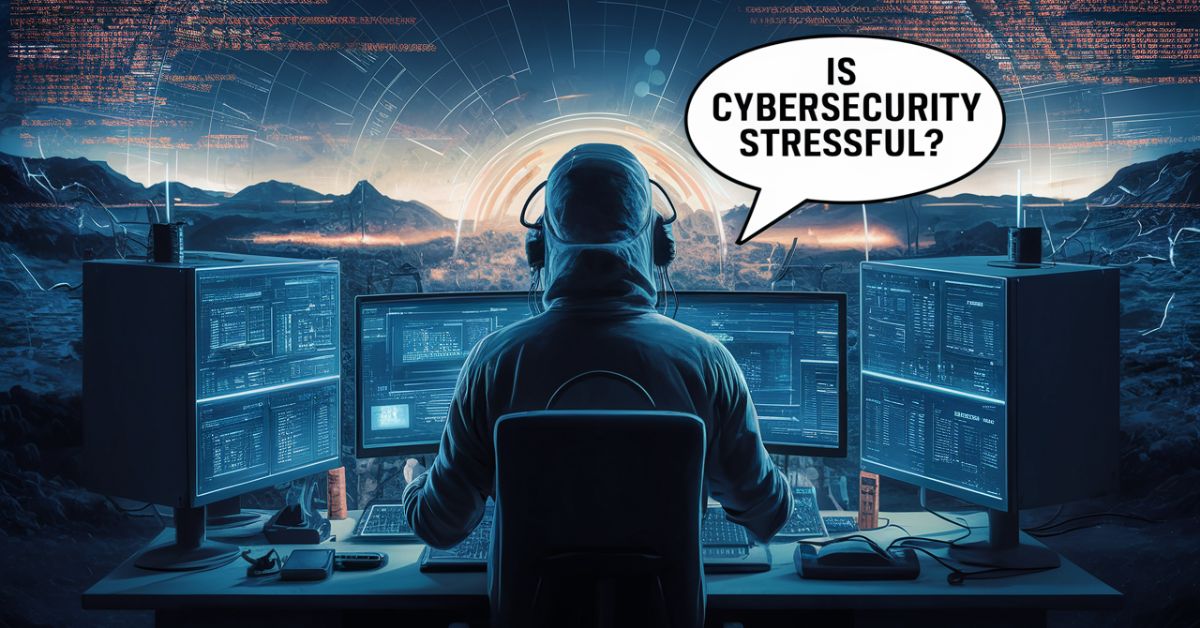In today’s hyperconnected world, the role of cybersecurity professionals has become increasingly crucial. As our reliance on digital systems grows, so does the need for robust protection against cyber threats. But with this importance comes a pressing question: This article delves into the high-pressure world of digital defense, exploring the factors that contribute to stress in the field and offering insights on how to manage these challenges. Is Cybersecurity Stressful? Navigating the High-Stakes World of Digital Defense.
Factors Contributing to Stress in Cybersecurity
The cybersecurity landscape is fraught with unique pressures that can take a toll on professionals in the field. Let’s explore the key factors that make cybersecurity a potentially stressful career choice.
Constant Threat Landscape Changes
The world of cyber threats is in perpetual motion, evolving at a breakneck pace. This constant flux is perhaps one of the most significant contributors to stress in cybersecurity. Professionals must:
- Stay vigilant and up-to-date with the latest attack vectors
- Continuously learn and adapt to new technologies and methodologies
- Anticipate and prepare for emerging threats before they materialize
This relentless need to stay ahead of cybercriminals can create a sense of never being “done” or fully secure, leading to chronic stress and anxiety among cybersecurity professionals.
High Stakes and Accountability
The consequences of a successful cyber attack can be devastating, both financially and reputationally. This places an enormous burden on cybersecurity teams. Consider these sobering statistics:
| Impact of Cyber Attacks | Statistics |
|---|---|
| Average cost of a data breach | $4.35 million (2022) |
| Average time to identify a breach | 207 days |
| Percentage of companies that experienced a cyber attack | 68% (2021) |
With such high stakes, cybersecurity professionals often feel the weight of personal responsibility for protecting sensitive information. The potential for public scrutiny and media attention in the event of a high-profile incident only adds to this pressure.
Lack of Resources and Budget Constraints

Despite the critical nature of their work, many cybersecurity teams find themselves understaffed and underfunded. This resource crunch can lead to:
- Overworked team members trying to cover too many responsibilities
- Inability to implement necessary security tools and technologies
- Difficult trade-offs between security needs and business operations
The constant struggle to do more with less can be a significant source of frustration and stress for cybersecurity professionals.
Long Hours and On-Call Duties
Cyber threats don’t operate on a 9-to-5 schedule, and neither can cybersecurity teams. The 24/7 nature of the job often leads to:
- Unpredictable work schedules
- Frequent on-call rotations
- Difficulty maintaining a healthy work-life balance
These demanding schedules can take a toll on personal relationships and overall quality of life, contributing to burnout and stress.
Pressure to Prevent Insider Threats
One of the most challenging aspects of cybersecurity is the need to protect against threats from within an organization. This responsibility can create unique stressors:
- Balancing security measures with employee privacy concerns
- Navigating the ethical considerations of monitoring colleagues
- Maintaining a culture of trust while implementing necessary safeguards
The dual role of protector and potential “Big Brother” can be emotionally taxing for cybersecurity professionals.
Ways to Reduce Stress in Cybersecurity
While the cybersecurity field undoubtedly comes with its share of stressors, there are strategies that professionals and organizations can employ to mitigate these pressures.
Establish Work-Life Balance
Creating clear boundaries between work and personal life is crucial for long-term sustainability in cybersecurity. Some effective strategies include:
- Setting defined work hours and sticking to them when possible
- Implementing fair rotation systems for on-call duties
- Encouraging the use of vacation time and mental health days
- Promoting healthy habits like regular exercise and mindfulness practices
Organizations that prioritize work-life balance often see improved productivity and retention among their cybersecurity teams.
Training and Skill Development
Investing in continuous education and skill development can help alleviate the stress of keeping up with the ever-changing threat landscape. Consider:
- Allocating time and resources for ongoing training
- Supporting the pursuit of relevant certifications
- Creating mentorship programs within the organization
- Fostering a culture of knowledge-sharing and collaborative learning
By building confidence and competence, cybersecurity professionals can feel more equipped to handle the challenges they face.
Resource Allocation
Addressing the resource constraints that often plague cybersecurity teams is crucial for reducing stress. Organizations should consider:
- Advocating for adequate staffing and realistic workloads
- Investing in automation and AI tools to streamline routine tasks
- Exploring managed security service providers (MSSPs) to augment in-house capabilities
Proper resource allocation can significantly reduce the burden on individual team members and improve overall security posture.
Incident Response Planning
Having a well-defined incident response plan can alleviate much of the stress associated with potential breaches. Key components include:
- Developing comprehensive playbooks for various scenarios
- Conducting regular drills and simulations to test readiness
- Establishing clear communication channels and roles during incidents
- Creating post-incident review processes to continuously improve response strategies
A robust incident response plan provides a sense of preparedness and control, reducing anxiety about potential security events.
Is Cybersecurity Hard for Beginners?

For those considering a career in cybersecurity, it’s natural to wonder about the difficulty of entering the field. While cybersecurity can be challenging, it’s not insurmountable for beginners who are dedicated and passionate about the work.
Key considerations for newcomers include:
- Technical skills: A solid foundation in networking, operating systems, and programming is beneficial.
- Analytical thinking: The ability to problem-solve and think critically is crucial.
- Continuous learning: Be prepared for ongoing education throughout your career.
- Soft skills: Communication and teamwork are often as important as technical abilities.
“The field of cybersecurity is vast and complex, but it’s also incredibly rewarding. Beginners should focus on building a strong foundation and be prepared to learn something new every day.” – Jane Doe, Cybersecurity Analyst with 10 years of experience
How Long Does it Take to Learn Cybersecurity?
The time required to learn cybersecurity varies depending on several factors:
- Prior experience: Those with IT backgrounds may progress more quickly.
- Learning path: Formal education programs typically take 2-4 years, while boot camps might be completed in a few months.
- Specialization: Some areas of cybersecurity may require more extensive study than others.
- Personal dedication: The amount of time invested in self-study can significantly impact learning speed.
It’s important to note that learning in cybersecurity is an ongoing process. Even experienced professionals must continue to update their knowledge and skills throughout their careers.
Find a Cybersecurity Program Today
For those ready to embark on a cybersecurity career, there are numerous educational pathways available:
- Bachelor’s and Master’s degree programs
- Professional certifications (e.g., CompTIA Security+, CISSP)
- Bootcamps and intensive training programs
- Online courses and self-study resources
When choosing a program, consider factors such as:
- Accreditation and industry recognition
- Hands-on learning opportunities
- Career support and job placement assistance
- Flexibility to accommodate your current work or life situation
FAQs
How stressful is working in cyber security?
The level of stress in cybersecurity can vary depending on the specific role, organization, and individual. While the field can be high-pressure due to its critical nature, many professionals find the work exciting and rewarding. Effective stress management strategies and supportive work environments can help mitigate the potential for burnout.
Is cyber security very hard?
Cybersecurity can be challenging due to its technical complexity and the need for continuous learning. However, with dedication and the right resources, it’s a field that’s accessible to those willing to put in the effort. Many professionals find the intellectual stimulation and problem-solving aspects of cybersecurity to be engaging rather than overwhelming.
Are cybersecurity employees happy?
Despite the potential for stress, many cybersecurity professionals report high job satisfaction. Factors contributing to happiness in the field include:
- The sense of purpose in protecting critical assets
- Opportunities for continuous learning and growth
- Competitive salaries and job security
- The dynamic and ever-changing nature of the work
Is cyber security harder than coding?
Cybersecurity and coding are different disciplines with overlapping skill sets. While cybersecurity often involves some coding knowledge, it also requires a broader understanding of systems, networks, and security principles. Some may find cybersecurity more challenging due to its multidisciplinary nature, while others may prefer it to the more focused task of coding.
Can I learn cyber security in 3 months?
While it’s possible to gain a basic understanding of cybersecurity principles in three months, becoming proficient typically takes longer. A three-month intensive program might prepare you for entry-level positions or certifications, but developing expertise in the field is an ongoing process that extends well beyond any initial training period.
Cyber Security reviews
Professionals in the field often share mixed but generally positive reviews of their cybersecurity careers:
Pros:
- Intellectually stimulating work
- A sense of purpose in protecting critical information
- Opportunities for growth and advancement
- Competitive compensation packages
Cons:
- High-stress environments during security incidents
- Pressure to stay constantly updated on new threats
- Potential for long or irregular hours
- Balancing security needs with business objectives
“Cybersecurity is not just a job, it’s a calling. The challenges are real, but so is the satisfaction of knowing you’re making a difference in an increasingly digital world.” – John Smith, Chief Information Security Officer
Conclusion
In conclusion, while cybersecurity can be stressful, it also offers immense opportunities for growth, impact, and personal satisfaction. By understanding the potential stressors and implementing effective coping strategies, professionals can navigate the challenges and thrive in this critical and evolving field. Whether you’re considering a career in cybersecurity or looking to manage stress in your current role, remember that the key lies in continuous learning, strong support systems, and a balanced approach to the demands of the job.








